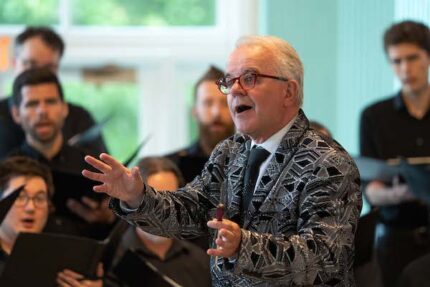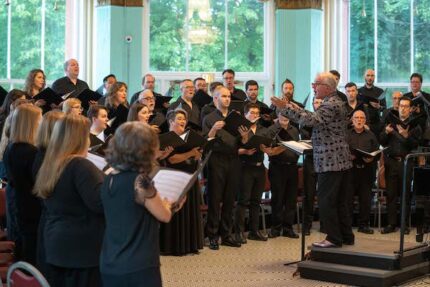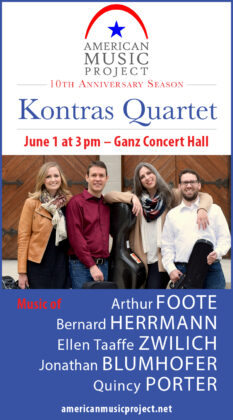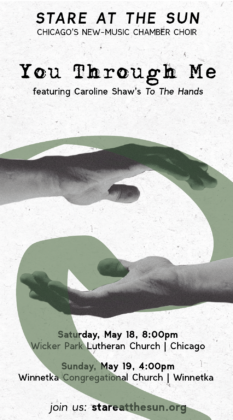Grant Park Chorus brings an emotional American program to South Shore

Longtime Chicago music lovers know June to be a portentous month. Regular concert seasons reach their finale, and artistic appointments turn over.
But such endings spark new beginnings as the city’s musicians emerge from cloistered downtown venues and reconfigure to greet the languid summer nights in performances out of doors and throughout the city.
Airs of pretension similarly defuse as these concerts descend upon more unassuming venues, as it did when the Grant Park Chorus came to the South Shore Cultural Center on Monday evening to present a brief yet scintillating program of approachable works by American composers.
The droll and amiable spokesperson for these works was Grant Park Music Festival chorus director Christopher Bell, who led the chorus and pianist Paul Nicholson in a selection of Aaron Copland’s Old American Songs to kick off the program in quintessential form.
This program dispensed of four of the suite’s more problematic selections (namely, those with origins in minstrelry). But the remaining six, among them such youthful touchstones as “I Got Me a Cat” and “Simple Gifts,” received spirited readings by the chorus; more austere selections, like “The Little Horses” and “At the River,” were handled with particular sensitivity as Bell shaped each song’s familiar phrases with care.
Bell proceeded to introduce a pair of works by Chicago composer and performer Ayanna Woods, whose eclectic musical mind has drawn commissions from such venerable ensembles as Third Coast Percussion, Chanticleer, and The Crossing. Bell — noting Woods’ contributions to the latter ensemble’s Grammy-nominated choral album — quipped that the evening’s specimens were chosen among those that had not been committed to wax, so as to avoid the threat of comparison.
That said, To Propagate a Home and Archive Alive are hardly B-sides. The former, originally written in 2019 for the World House Choir, was given a suitably breezy treatment, making room both for moments of fine bella voce singing and for the score’s catchy, poppish hooks to coexist.
Archive Alive was composed in 2022 in collaboration with the Yale University Glee Club, of which Woods is a former member. This score is more thematically exploratory than the former, with far-ranging harmonic and melodic concepts that elevate the piece’s original text. Under Bell’s keen direction, the chorus’ s performance was marked with crisp articulation and technical vigor that brought the setting’s musical and textural elements alike into focus.

The program’s gravitational center was the Nocturnes by the dean of contemporary American choral music, Morten Lauridsen. While every piece on the program featured texts threaded with themes of uplift, Lauridsen’s nocturnes temper these with hues of melancholy and longing.
The entire piece, in fact, was presented with a similarly reverential air. Where Bell accepted or even invited applause between installments of the program’s other multi-movement works, each movement of Morten Lauridsen’s Nocturnes was performed without pause.
Such a work suited the fully fledged iteration of the Grant Park Chorus — more than sixty in all, on this occasion. Awash in the shimmery acoustic produced by the venue’s high ceiling and tiled floor, Lauridsen’s moody harmonies billowed like watercolors on the opening “Sa nuit d’été.” Pianist Nicholson furnished tasteful ornamentation and discreet support to balance the reverberant voices throughout the work.
The second nocturne proved a particularly affecting highlight of this already emotive score. “Soneto de la Noche,” on verses by Pablo Neruda, tells of a dying lover’s wish that their partner live fully so that the speaker may live on through the other. Delivered with organ-like sonority and the solemnity of a hymn, the reprise of the setting’s opening stanzas induced more than a handful of suppressed sniffles from the audience.
The program closed with Illuminare by the Iowa-based composer Elaine Hagenberg. In the program notes, Hagenberg describes the work as a five-movement journey on lesser-known sacred Latin texts from light through darkness and back to light. The work’s musical content is equally archetypal — and well-trodden — but for whatever it left wanting in original concepts, it made up for in emotive potential. Naturally, Bell and his singers wrung out every drop.
A somewhat modest tempo for the shimmery opening dulled the arrival of the first movement’s more moderate interior section. Nevertheless, Bell drew elementally pure sound from the chorus’s treble voices in the childlike second movement, “Caritas” (on a text by Hildegard von Bingen), and the reverential fourth, “Munera Pacis,” was nothing short of lovely.
The concluding “Illuminare his” once again mines the big-boned, borderline saccharine harmonic vernacular of the first movement, yet all the same, Bell and his singers dutifully advocated for this score with rich, full-bodied choral sound. The music found its mark with the night’s very game audience, and the patrons of the South Shore Cultural Center were lifted to their feet in applause.
This program will be repeated 6:30 p. m. Tuesday at the Columbus Park Refectory. grantparkmusicfestival.com
Posted in Performances



